
Assignments
I’m excited to write, to make and to think about the teaching of writing with you all this semester. Please reach out, of course, if something doesn’t make sense. Happy to help.
Note: What you will find below is a brief overview of assignments: I’ll provide expanded explanations in the Make Cycle instructions (and in video updates). You can find the Make Cycle instructions by clicking on the drop down menu under Make Cycles at the top of our course site (menu above). I’ll post a new Make Cycle every two weeks.
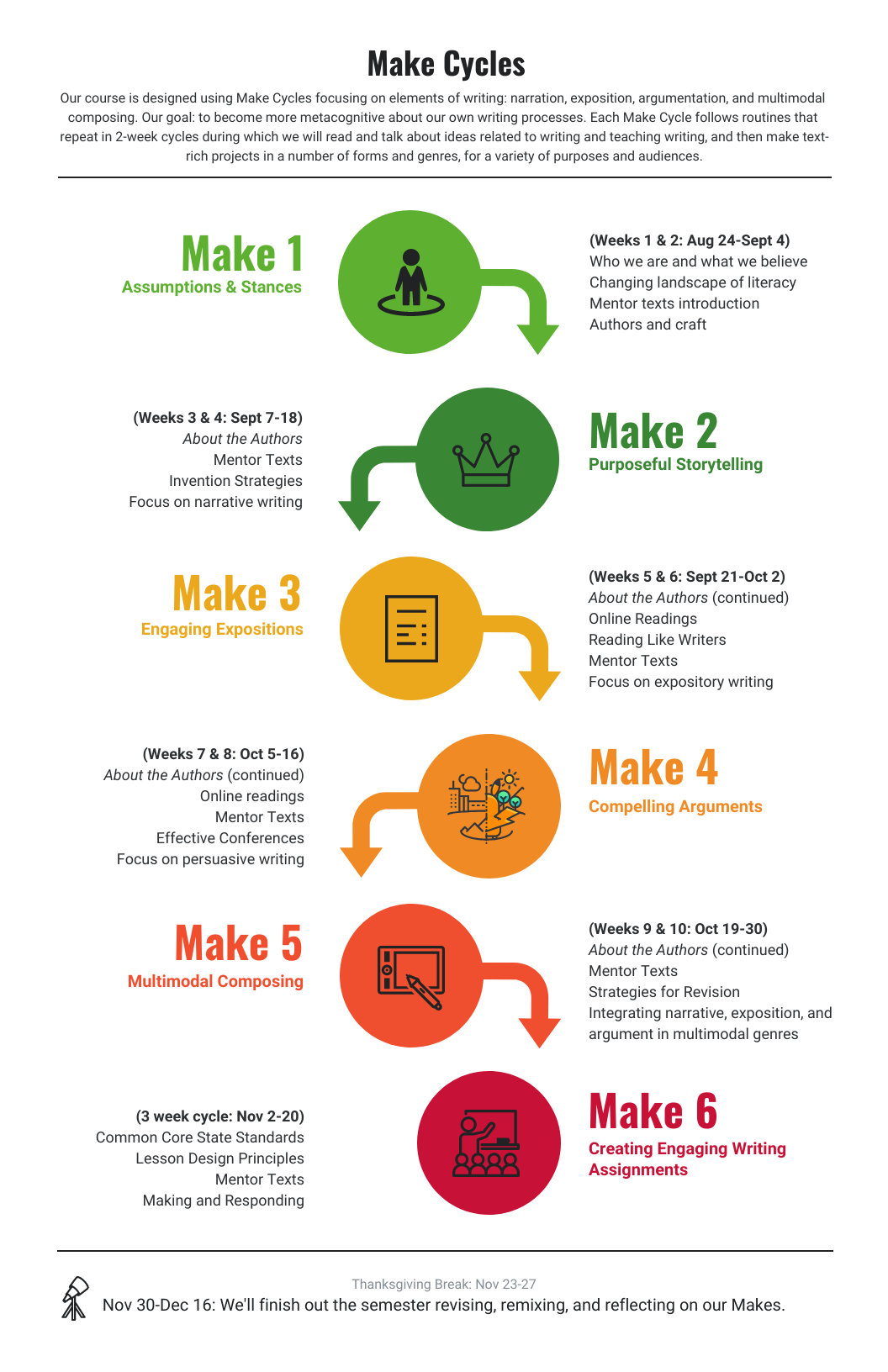
Make Cycle Assignments:
- Discussions of readings/peer response
- Mentor texts to give us ideas for writing
- Makes
Other Assignments:
- Picture Book Resource
- Reflection & Manifesto
Make Cycles
Discussions (12@10: 120 points)
Response to Peer (10@5 points: 50 points total)

Most weeks, I will pose a couple of prompts connected to the reading we are doing. You’ll write a response and share the response in our Google Currents Community. Note: I will have a subheading on the left hand side of our Currents space to help keep our posts organized. Please post under those categories (i.e. Week One: Intro & Literacies). The responses will typically be due on Sundays. You’ll also respond to a peer’s post each time; since you are planning to teach, I see the comments to each other’s responses as a way to try out responding to writing. As a writing teacher, you’ll comment on student writing all the time: hoping this is a space to try that out, give each other encouragement and celebrate great ideas.
Mentor Texts (5@10points: 50 points)
Mentor texts are: “pieces of literature that you—both teacher and student—can return to and reread for many different purposes. They are texts to be studied and imitated…Mentor texts help students to take risks and be different writers tomorrow than they are today. It helps them to try out new strategies and formats. They should be basically books that students can relate to and can even read independently or with some support. And of course, a mentor text doesn’t have to be in the form of a book—a mentor text might be a poem, a newspaper article, song lyrics, comic strips, manuals, essays, almost anything.”
Each Make Cycle includes a chance to work with a mentor text, usually a children’s picture book. We’ll use these mentor texts to play with ideas for writing, and hopefully, to inspire ideas for your Makes. I’ll share a video from a book or poem and ask you to notice some of the interesting features of that text. You’ll consider how you might borrow from those features in your own writing, and how you might use these books in your teaching.
Make Cycle Projects (5@25 points; 125 points total)
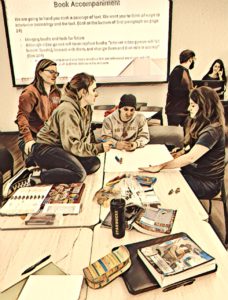 Each Make Cycle will offer you options to make a writing-based project. There will be two parts to every project:
Each Make Cycle will offer you options to make a writing-based project. There will be two parts to every project:
- 1) The “make” itself (be it a story, a poem, an infographic, a nonfiction report, etc.) We’ll use the “makes” as a way to play with the ideas we’re discovering in our reading and informal writing. You have complete control over what you make. I’ll give suggestions in case you’re stuck, but you decide what “artifact” you want to make that amplifies what you’re learning about an element of writing and the teaching of writing. Take some risks here: sometimes the “make” won’t turn out the way you planned. We’ll write short reflections of these “makes” so you have a chance to explain what worked and what didn’t quite turn out like the picture in your head. You make a thing: I’ll give you points. Hope this is an invitation to play with ideas, platforms, digital tools, ways of representing what you’re learning, and/or ways to create assignments for your future classrooms.
2) A brief reflection on the make, explaining what you were trying to do with the make and the techniques and processes you used in creating it.
Typically due on Sundays at the end of the two week make cycle. Share in our Currents Community: look for the category heading (Make Cycle: Make) on the left hand side of our Currents page.
Points breakdown: 1) 15 points for the make itself; and 2) 10 points for reflection and process explanation. 25 points total.
Make Cycle 6: Make (3 week cycle)
Create a Writing Assignment (25 points)
Partner tries out assignment (15 points)
Reflection & Revision of Assignment (10 points)
50 points total
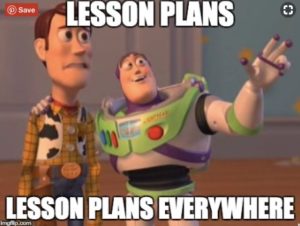
As part of our work in Make Cycle 6, you’ll take what you’ve learned so far and create a writing activity. You’ll be the teacher and one of your classmates will be your student: the student will try out your assignment. And, you’ll try out your partner’s activity too. Basically, you are both creating an assignment as the teacher and trying out the other person’s assignment as the student.
Part I: You will create a writing activity for your partner to try out.
Part II: You’ll try out the writing activity from your partner.
PART III: You’ll write a reflection about your activity plan: how did your activity work out? Did the writer (your partner) complete the activity like you expected? Anything surprise you? What would you revise in the activity based on the writer’s work and their feedback to you?
I’ll share examples and more information in Make Cycle 6.
Other Assignments
Picture Book Resource: Mentor Text (15 points)
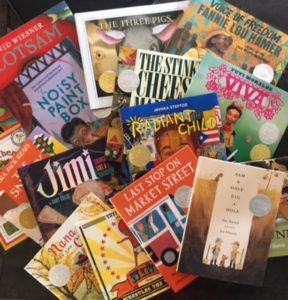
I will randomly assign you a picture book author (see link below). Find books by that author through the author’s website or look for the books being read through youtube videos or order a couple of the author’s books to have for your classroom library.
Resource: Create a resource for us (a Google Slideshow, a website, a video of you talking about the author and reading from some of the books, a lesson plan) that we could refer to as a resource in our future classroom. Pay particular attention to how the book could serve as a mentor text for your students.
No matter the format you choose, your resource should include the following parts in whatever order makes sense to you:
- Show us book titles, author info, awards, interviews or videos with the author
- Give us a feel for the book(s) (link to a video of one of the books being read or you reading from the books or links to sample pages from the publisher or the author website)
- Find resources for lesson plans (be sure to give credit to where you found the lesson plan and say why you like it)
- Finally, explore how you might use the book (or books) to anchor a class plan or activity, particularly as a mentor text. What features of the writing could you model with students? Create an activity using the book as the mentor text.
You’ll share your resource in our Currents Community under the Picture Book subheading. You can complete this assignment anytime before Oct 30.
—>HERE IS THE LINK, which shows you the picture book author you’ve been assigned. All authors are Caldecott winners.
Here’s an example from a previous semester
Manifesto on Teaching Writing (including one Revised/Remixed Make Cycle project) (Manifesto 25 points; revised Make 15 points: 40 points total)
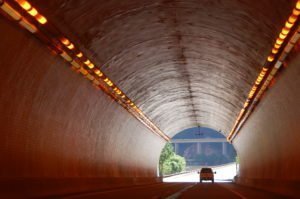 This is the culminating assignment for the class. You will write a manifesto that describes your beliefs about the teaching of writing, and articulates your intentions as a future teacher to implement those beliefs. In it, you will also use one revised, remixed, or otherwise refined projects from the class’s Make Cycles to exemplify your ideas about writing and writing pedagogy.
This is the culminating assignment for the class. You will write a manifesto that describes your beliefs about the teaching of writing, and articulates your intentions as a future teacher to implement those beliefs. In it, you will also use one revised, remixed, or otherwise refined projects from the class’s Make Cycles to exemplify your ideas about writing and writing pedagogy.
Here are examples from a previous semester that may be helpful:
Grace’s reflection & manifesto
Rafael’s reflection & manifesto
Total Points: 450
(Grade: 95-100%=A, 90-94%=A-, 85-89%=B+, 80-84%=B, etc)
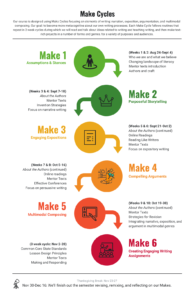 You can find our current Make Cycles in the drop down menu and on the
You can find our current Make Cycles in the drop down menu and on the